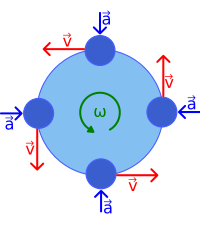Physics/Synopsis
Force
[edit | edit source]Force Symbol Mathematical Formula Opposing Force Gravity Force Motion Force Pressure Force Elastic Force Circulation Force Centripetal Force Electrostatic Force Electromotive force Electromagnetomotive Force Electromagnetic Force
Linear Motion
[edit | edit source]- O ----> O
Distance Time Speed Accelleration Force Work Energy
- O
- ↓
- O
Distance Time Speed Accelleration Force Work Energy
Distance Time Speed Accelleration Force Work Energy
Distance Time Speed Acceleration Force Work Energy
Circular Motion
[edit | edit source]Distance Time Speed Acceleration Angular spped Frequency Force Work Energy
Distance Time Speed Acceleration Force Work Energy
Characteristics
[edit | edit source]Speed Mass Momentum Force Work Energy
Speed Mass Momentum Energy
Speed Mass Energy Momentum Wavelength
Equilibrium Speed Radius
Equilibrium Speed
With
to have
Equilibrium Speed Radius Potential Energy Level n
Wave
[edit | edit source]AC electrical sinusoidal wave generator
[edit | edit source]An interaction of 2 electromagnets creates an AC electricity that has amplitude varies sinusoidally
LC sinusoidal wave generator
[edit | edit source]Series LC operates at equilibrium satisfy wave equation
that has root of a sinusoidal wave function
Electromagnetic sinusoidal wave generator
[edit | edit source]A coil of N turns operates at equilibrium satisfy wave equation
that has root of a sinusoidal wave function
Wave Characteristics
[edit | edit source]Distance Time Speed Angular speed Frequency Sinusoidal wave equation Sinusoidal wave function
Wave types
[edit | edit source]Wave 2 dimensional sinusoidal wave 3 dimensional sinusoidal plane wave 

Wave oscillation equation Wave function
Electricity Types
[edit | edit source]Electricity types Definition Mathematical Formula Source DC Electricity Electricity that provides constant voltage over time Electrolysis, Electrochemcial Cell, PhotonVoltaic AC Electricity Electricity that provides sinusoidal changing voltage over changing time Electromagnetic induction
DC & AC Response
[edit | edit source]Characteristics DC AC Voltage Current Resistance Power provided Power Loss Power delivered Reactance Impedance Phase
Characteristics DC AC Voltage Charge Capacitance Current Power provided Reactance
Impedance
Phase Time Constant
Characteristics DC AC Magnetic Field Strength Current Inductance Current Power provided Reactance
Impedance
Phase Time Constant
Electromagneticism
[edit | edit source]Electric charge
[edit | edit source]Charge acquired process Electric charge Charge quantity Electric field Magnetic field Matter + e- - -Q -->E<-- B ↓ Matter - e- + +Q <--E--> B ↑
Electromagnetic force
[edit | edit source]Force Symbol Mathematical formula Electrostatic Force Electromotive Force Electromagnetomotive Force Electromagnetic Force
Electromagnetic Field
[edit | edit source]Configuration Symbol Mathematical Formulas For any configuration For straight line conductor Circular B field For circular loop conductor Circular B field around a point charge For coil of N circular loops conductor Eleptic B field around the coil
Electromagnetic Principles
[edit | edit source]
Electromagnetic field
Induced electromagnetic field
Electromagnetization field
Eletromagnetization
Coil's voltage induction intencity
Turn's induced voltage intencity
Photon
[edit | edit source]Photon is defined as energy of a massless quanta travels as an electromagnetic oscillation wave radiation at speed equal to speed of light Mathematical formula of
Photon exist in 2 states
- Radiant Photon at threshold frequency fo
- Non Radiant Photon at frequency greater than threshold frequency fo
- . With f>fo
Photon can only exist in one state at a time . This is Heiseinberg's uncertainty principle the success rate of finding photon
Quanta of Photon
[edit | edit source]Quantity of photon's energy . Quanta is denoted as h measured in has a constant value h =
Quanta process Wave particle duality meaning
- Sometimes it behaves like wave
- Sometimes it behaves like particle
Photon and matter
[edit | edit source]Photon and matter interacts to create Heat transfer through 3 phases Heat conduction, Heat convection and Heat radiation
Heat transfer Heat conduction Matter changes it's temperature while absorb heat energy
Heat convection Matter conducts heat energy to the max at Threshold frequency fo
Heat radiation Matter uses excess energy above maximum absorbing energy to release electron off atom
. When v>0
with f > fo
Causes matter to decay through 3 kinds of decays
Mattter decay Reaction Alpha decay Ur--> Th - He + Alpha radiation Beta decay C-->N + Beta radiation Gamma decay ee) + Gamma radiation
Experiment has shown that, electron of an atom can be freed or binded from absorbing or releasing photon's energy
Atom decay Absorbing photon energy Releasing photon energy Equilibrium v r n
















































































































































































































































